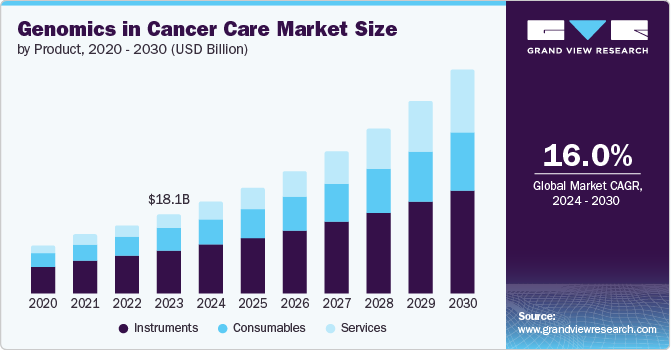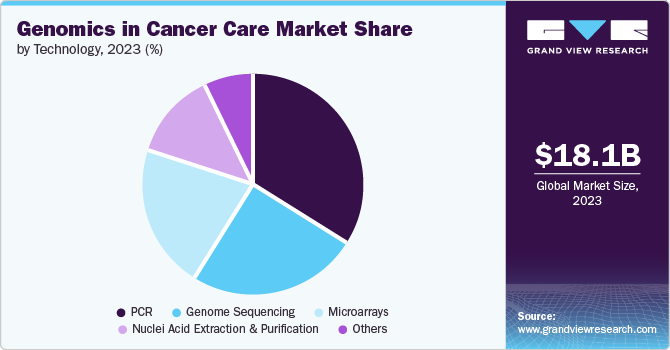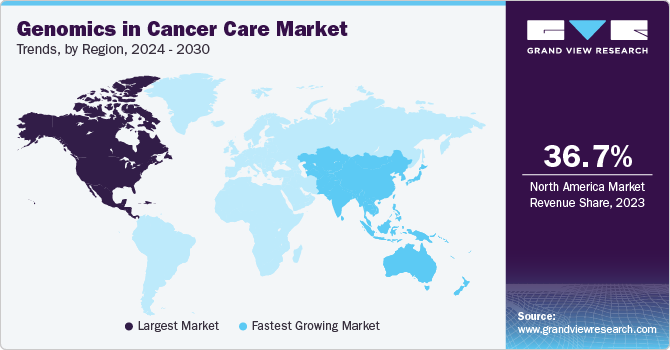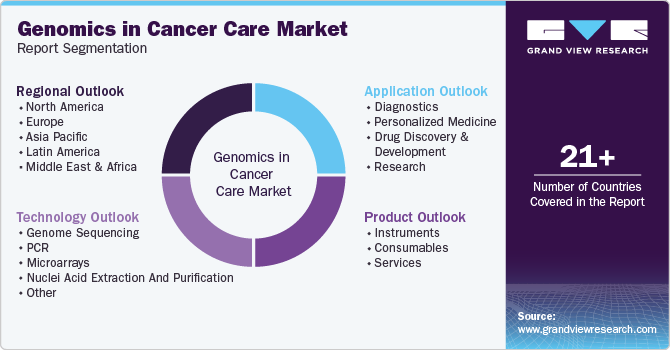
Genomics In Cancer Care Market Size, Share & Trends Analysis Report By Product (Instruments), By Application (Diagnostics, Personalized Medicine), By Technology (Genome Sequencing, PCR), By Region, And Segment Forecasts, 2024 - 2030
- Report ID: 978-1-68038-717-9
- Number of Report Pages: 120
- Format: PDF, Horizon Databook
- Historical Range: 2018 - 2022
- Forecast Period: 2024 - 2030
- Industry: Healthcare
Genomics In Cancer Care Market Trends
“2030 genomics in cancer care market value to reach USD 50.97 billion”
The global genomics in cancer care market size was valued at USD 18.12 billion in 2023 and is projected to grow at a CAGR of 16.0% from 2024 to 2030. The primary factor for market growth is the increase in cancer cases and the growing demand for personalized treatment. According to the World Health Organization (WHO), 20 million new cancer cases were reported in 2022, leading to 9.7 million deaths. Technological innovations, a rise in investment, increased research and development activities, and declining sequencing costs are other factors driving growth in the market.

Cancer is the leading cause of death globally, accounting for approximately 10 million deaths in 2020. This rise in the number of cancer cases is contributing to the development of new and advanced treatment options and several government initiatives related to cancer and genomics. For instance, the government of India launched GenomeIndia, a research initiative, in January 2020 funded by the Department of Biotechnology and the Ministry of Science and Technology. The genetic sequencing of the population developed by GenomeIndia is expected to help bring genetics to the application of personalized medicine and empower researchers and clinicians to find genetic diagnoses for rare and complex disorders, adding to the growth of the genomics market.
Technological innovations in life sciences, such as high-throughput sequencing (NGS), are also driving market growth. According to a study published by the National Library of Medicine in October 2021, sequencing technology can decrease the cost of sequencing a human genome to less than USD 100 per person while achieving high efficacy.
Illumina’s Next-generation sequencing (NGS) is a sequencing technology used to determine the order of nucleotides in an entire targeted region of RNA or DNA, allowing labs to perform several applications. The technology offers high efficacy, is less expensive, and is less time-consuming. The development of such technologies is further expected to help with market growth.
New DNA sequencing techniques have emerged as a pathbreaker in genomics. Organizations are coming forward to develop this technology and support the growth of genomics in cancer care. For instance, the National Human Genome Research Institute (NHGRI) supports the research and development of novel technologies and approaches in DNA sequencing through the Genome Technology Program.
Most cancers are caused by acquired genomic variants, as they are diseases of the genome. Advances made in the field are shaping oncology practice and rapidly helping patients.The rising number of cancer cases and increasing demand for treatments are further driving the investment in genomics. Firms are coming forward to invest in genomic technology, research, and development. For instance, Illumina Inc.’s business accelerator partner, Illumina Accelerator, invested in seven genomics startups in September 2021.
Product Insights And Trends
“The services segment is expected to witness growth at 24.1% CAGR.”
Instruments dominated the market and accounted for a share of 54.8% in 2023. Various genomics instruments are available to suit genomic research needs. For instance, Illumina Inc. launched its first product based on its novel technology in March 2023, namely, Illumina Complete Long Read Prep, Human, which enables long—and short-read sequencing instruments. The product is based on long-read technology utilized for human whole-genome sequencing (WGS).
With the decline in sequencing costs, whole genome sequencing (WGS) has become a feasible tool for genomic research as it can translate 3 billion DNA base pairs. This allows doctors and researchers to view the entire genome, which is helpful for discovery applications, such as identifying causative variants. The technological advancements and the latest genome sequencers are potent in performing whole-genome sequencing more efficiently.
The services segment is expected to grow at the fastest CAGR over the forecast period. The key players in the market offer an array of genomic services, such as genotyping services, whole genome sequencing services, genomic instrument services and training, sequencing services, and microarray services, which are contributing to the segment growth. For instance, Illumina Inc. reported an increase in 2023 revenue due to a rise in maintenance service contracts.
Application Insights And Trends
"The drug discovery and development segment is expected to grow at a CAGR of 18.5%."
Diagnostics accounted for the largest market revenue share in 2023. This growth is attributed to increased rare inherited diseases and the need for diagnosis and treatment. The researchers are adopting whole genome sequencing as it has the potential to diagnose the genetic disease quickly. Illumina Inc. reported that 49-75% of pediatric patients who received whole genome sequencing saw a positive change. For instance, a pediatric patient, after seven years of exhaustive futile tests, found a WGS diagnosis to identify a genetic mutation and was diagnosed with eta-propeller protein-associated neurodegeneration (BPAN).
Drug discovery and development is expected to register the fastest CAGR during the forecast period. With the increased prevalence of rare diseases, about 85% of which are ultrarare and affect one in a million individuals, drug discovery and development have become a primary concern for healthcare specialists. For instance, Deep Genomics raised USD 180 million in investments in July 2021 to expand its AI discovery platform and advance its portfolio.
Technology Insights And Trends
"The microarrays segment is expected to grow at a CAGR of 19.0%."
PCR accounted for the largest market revenue share in 2023. Polymerase Chain Reaction (PCR) is a laboratory technique used to rapidly create millions and billions of copies of the specific segment of DNA to be studied in detail. The high prevalence of cancer and efforts to develop more advanced and efficient diagnosis and treatment solutions is driving the growth of the PCR segment. For instance, in March 2022, researchers from the Queen Mary University of London developed the first PCR test for oral cancer to help improve oral cancer detection and treatment.

Microarrays are expected to register the fastest CAGR during the forecast period. Microarrays are an integral laboratory tool as they can detect thousands of genes at the same time. It can help identify and understand the complex nature of the tumor. In addition, its ability to identify thousands of genes makes it useful for laboratories at an effective cost. The increased genomics activities, adoption of DNA microarrays, and technological innovations are expected to drive market growth. For instance, the innovative technology of vaccine microarray patches can potentially surge global immunization coverage, as per UNICEF.
Regional Insights & Trends
“U.S. to witness market growth of CAGR 16.2%”
North America genomics in cancer care market dominated the market with the revenue share of 36.7% in 2023. The growth of the market is attributed to the favorable government initiatives to encourage research in the respective field. Several companies are coming forward in developing the genomics field and collaborating with institutions. For instance, the Mount Sinai health system and Icahn School of Medicine launched a new human genome sequencing program in August 2022 called Mount Sinai Million Health Discoveries Program with the Regeneron Genetics Center (RGC), an industry-based collaboration.

U.S. Genomics In Cancer Care Market Trends
The genomics in cancer care market in the U.S. accounted for a market share of 26.3% in the global genomics cancer care market in 2023. The U.S government initiatives are supporting the adoption of genome science disciplines across the nation. The research projects are in the working stage for paving the way in precision medicine through genome sequencing. For instance, the National Institutes of Health (NIH) announced in April 2023 that the All of Us program made approximately 250,000 whole genome sequences to initiate advances in the field of precision medicine.
Europe Genomics In Cancer Care Market Trends
Europe’s genomics market was identified as a lucrative region in this industry with its rapid strides towards genomic development. For instance, Europe’s 1 million genome initiative aims to improve disease prevention and create advances in personalized treatment. It also purposed to build a European network of genomic reference cohorts of nearly 500,000 citizens. Such initiatives are expected to drive growth in the market.
UK genomics in the cancer care market is growing significantly due to a surge in activities such as government initiatives and companies collaborating to develop the market. For instance, Genomics England and Oxford Nanopore Technologies announced a collaborative venture in November 2023 on sequencing rare diseases. Such collaborations are surging in the region, which helps in market growth.
France’s genomics in the cancer care market is growing owing to companies creating strategic partnerships aiming to advance in precision medicine. For instance, Genomic Sweden Medicine (GMS) and France Genomic Medicine entered into a partnership in October 2021. The partnership aims to implement genomics and precision medicine approaches into the healthcare sector and provide better solutions for cancer and rare diseases.
Asia Pacific Genomics In Cancer Care Market Trends
Asia Pacific region is expected to register the fastest CAGR over the forecast period. The increase in cancer cases prevalent in the region as per the World Economic Forum report published in October 2023, Asia registered 45% of global breast cancer cases and 58% of cervical cancer deaths. Such prevalence is expected in the genomics market in cancer care to surge in the region as it can help in the treatment. For instance, according to the National Cancer Institute, some genomic changes in cervical cancer indicate the possibility of treating the disease with available drugs.
Japan’s genomics in the cancer care market is striding towards development due to a rise in cancer cases. According to the National Cancer Center in Japan, 380,400 cancer deaths were reported in 2022. To seek solutions and help reduce cancer deaths, Japan began Cancer Genomic Medicine (CGM) in June 2019 by approving cancer gene panel tests covered in the national health insurance system. Furthermore, the center for Cancer Genomics and Advanced Therapeutics (C-CAT) made the clinical and genomic data available to Cancer Genomic Medicine (CGM) hospitals, academic organizations, and businesses.
China’s genomics in the cancer care market is growing steadily owing to the collaborations and partnerships of various companies in the field of genomics. For instance, Illumina Inc. announced an extended partnership with a Chinese next-generation sequencing oncology diagnostic firm, Burning Rock DX, in 2020.
Key Genomics In Cancer Care Company Insights
Some key companies in genomics market of cancer care include- Illumina Inc., Agilent Technologies, Inc, Roche Diagnostics, GE Healthcare, Abbott Laboratories, Bio-Rad Laboratories, Inc. Key companies are involved taking strategic initiatives such as in innovating new products, collaborating with institutions and other industries, and establishing partnerships.
-
Illumina Inc. is a global genomics and human health company operating in the field of precision medicine. The company offers sequencing and array solutions with a wide portfolio comprising integrated sequencing and microarray systems. The company is taking strategic initiatives to expand its genomics portfolio to deliver solutions in the respective field.
-
F. Hoffmann-La Roche Ltd is offers diagnostic solutions and develops techniques that cater individual genetic and disease profiles. The company has a wide array of sequencing product portfolio such as sample prep reagents, NGS oncology assays, NGS automation MagNA Pure 96 system, KAPA HyperCap workflow, and KAPA HyperExome V2 Probes.
Key Genomics In Cancer Care Companies:
The following are the leading companies in the genomics in cancer care market. These companies collectively hold the largest market share and dictate industry trends.
- Agilent Technologies, Inc.
- F. Hoffmann-La Roche Ltd
- Beckman Coulter, Inc.
- Illumina Inc.
- Abbott
- Cancer Genetic Inc.
- Bio-Rad Laboratories, Inc.
- PacBio
- GE Healthcare
- Quest Diagnostics Incorporated
- PerkinElmer
- Luminex
Recent Developments
-
In April 2024, Eurofins Genomics AgriGenomics Europe and Gencove announced a collaboration to offer a complete solution for IpWGS in Europe to deliver high throughput and cost-effective genome sequencing.
-
In November 2021, GE Healthcare announced its collaboration with SOPHiA GENETICS with an aim to expand advance care, make precision medicine more accessible, and assist cancer patients.
-
In September 2021, Schott acquired Applied Microarrays Inc. to expand their diagnostics business aiming to extend its manufacturing presence in the U.S through this agreement.
Genomics In Cancer Care Market Report Scope
|
Report Attribute |
Details |
|
Market size value in 2024 |
USD 20.93 billion |
|
Revenue forecast in 2030 |
USD 50.97 billion |
|
Growth Rate |
CAGR of 16.0% from 2024 to 2030 |
|
Base year for estimation |
2023 |
|
Historical data |
2018 - 2022 |
|
Forecast period |
2024 - 2030 |
|
Report updated |
August 2024 |
|
Quantitative units |
Revenue in USD million and CAGR from 2024 to 2030 |
|
Report coverage |
Revenue forecast, company ranking, competitive landscape, growth factors, and trends |
|
Segments covered |
Product, Application, Technology, Region |
|
Regional scope |
North America, Europe, Asia Pacific, Latin America, MEA |
|
Country scope |
U.S., Canada, Mexico, Germany, UK, France, China, Japan, India, South Korea, Australia, Brazil, KSA, UAE, South Africa |
|
Key companies profiled |
Agilent Technologies, Inc., F. Hoffmann-La Roche Ltd, Beckman Coulter, Inc., Illumina Inc., Abbott, Cancer Genetics Inc., Bio-Rad Laboratories, Inc, PacBio, GE Healthcare, Quest Diagnostics Incorporated, PerkinElmer, Luminex. |
|
Customization scope |
Free report customization (equivalent up to 8 analysts working days) with purchase. Addition or alteration to country, regional & segment scope. |
|
Pricing and purchase options |
Avail customized purchase options to meet your exact research needs. Explore purchase options |
Global Genomics In Cancer Care Market Report Segmentation
This report forecasts revenue growth at global, regional, and country levels and provides an analysis of the latest industry trends in each of the sub-segments from 2018 to 2030. For this study, Grand View Research has segmented the global genomics in cancer care market report based on product, application, technology, and region.

-
Product Outlook (Revenue, USD Million, 2018 - 2030)
-
Instruments
-
Consumables
-
Services
-
-
Application Outlook (Revenue, USD Million, 2018 - 2030)
-
Diagnostics
-
Personalized Medicine
-
Drug Discovery & Development
-
Research
-
-
Technology Outlook (Revenue, USD Million, 2018 - 2030)
-
Genome Sequencing
-
PCR
-
Microarrays
-
Nuclei Acid Extraction And Purification
-
Other
-
-
Regional Outlook (Revenue, USD Million, 2018 - 2030)
-
North America
-
U.S.
-
Canada
-
Mexico
-
-
Europe
-
Germany
-
UK
-
France
-
-
Asia Pacific
-
China
-
Japan
-
India
-
South Korea
-
Australia
-
-
Latin America
-
Brazil
-
-
Middle East and Africa (MEA)
-
KSA
-
UAE
-
South Africa
-
-
We are committed towards customer satisfaction, and quality service.
"The quality of research they have done for us has been excellent."




